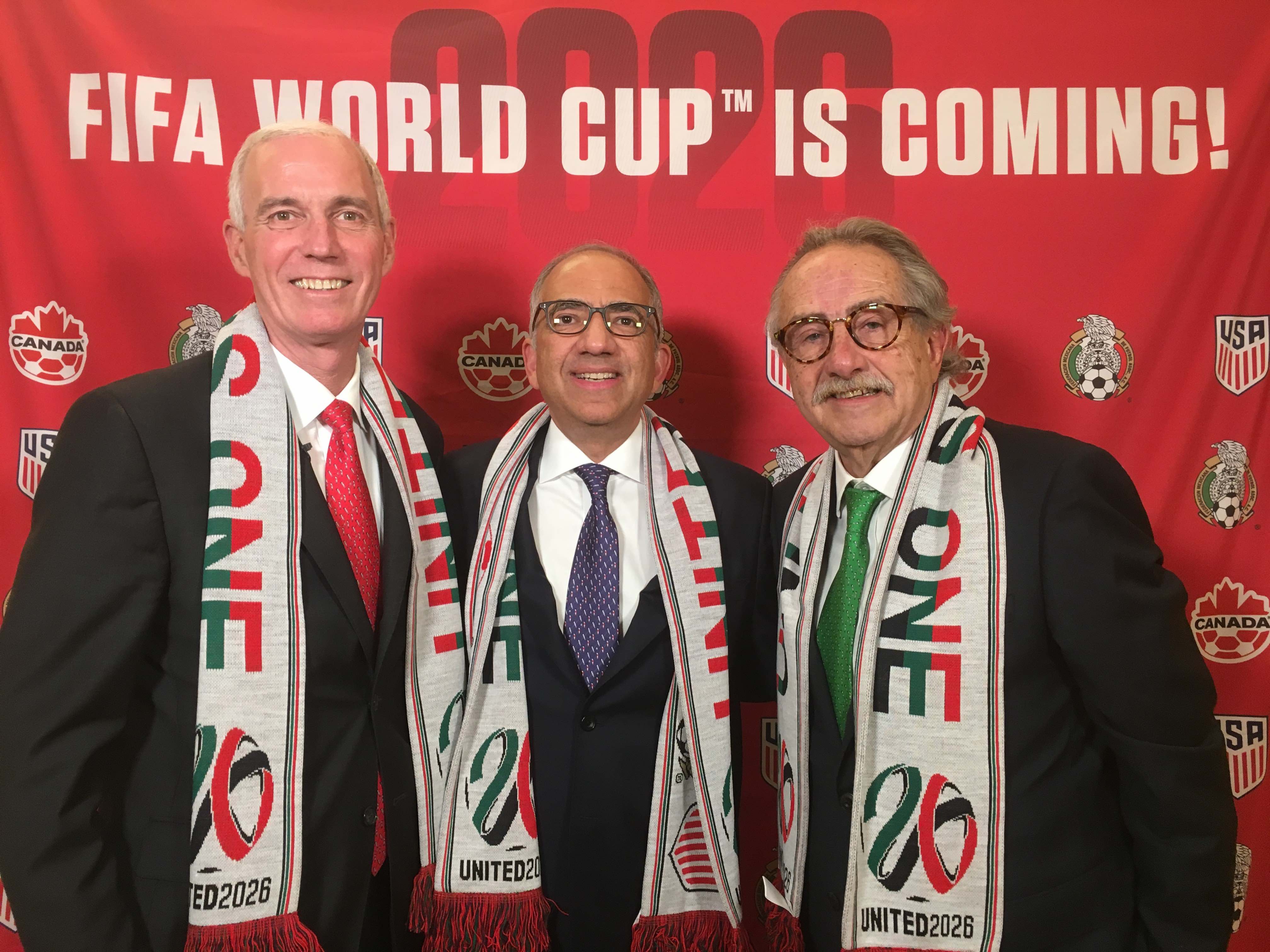By Andrew Warshaw in Moscow
June 14 – So, after months of criss-crossing the globe, how did they manage to win so emphatically? As leaders of the triumphant North American 2026 World Cup bid took in the totally unexpected margin of victory, they were honest enough to admit that even they didn’t expect such an outcome.
Devastated by losing out to Qatar for 2022 eight years ago, victory will have tasted all the more sweet for the USA as they all but trounced sole rivals Morocco to bring the biggest sporting event on earth back to CONCACAF for the first time in 32 years.
This time, of course, the USA were partnered with Mexico and Canada, a triumvirate which was undoubtedly stronger than the sum of its parts.
For sure, Morocco will argue they were promised votes that never materialised – a familiar refrain post FIFA polls, open vote or no open vote.
But even taking into account United’s superior infrastructure for the first ever 48-team World Cup; even allowing for far fatter revenue projections than the underdogs could possibly match, the 134-65 ballot result came as somewhat of a bombshell to most who have followed the process, not least United themselves.
As their campaign picked up steam around the midway stage, the Moroccans had been quietly confident – in public at least – that they could spring a major upset if not quite on the scale of Qatar’s seismic success.
It was only in the final weeks and days of lobbying that United seemed to nail down firm support among any waverers, their togetherness proving pivotal as they realised they could not be caught – despite Donald Trump’s untimely tweets.
Steven Reed, president of the Canadian Soccer Association, couldn’t hide his delight.
“I don’t think we thought we would have such overwhelming support,” he told reporters. “We were very humble in terms of the campaign but it was just how the amount of work we did over the past year and in particular over the last six weeks which came to fruition.”
Explaining the strategy he added: “We had three teams led by each of the co-chairs and scanned out to every federation and every confederation we could possibly visit to send our message and tell them about quality and merits of our bid. It was an amazing amount of work by a dedicated team over a long period of time.”
As well as a wave of the support from the Americas, Europe and Asia and a fair few from Africa, perhaps United’s greatest coup, on the eve of the World Cup here, was somehow persuading today’s Russian hosts, long considered to be in Morocco’s camp for 2026, to jump ship. Unthinkable, most experts thought.
“This was never about geopolitics,” US Soccer boss Carlos Cordeiro, who had wiped away tears in the emotion of the occasion when United were announced as winners, explained when asked about Russia’s sudden volte face. “It was not a vote in the United Nations but among football associations. We tried to make the case about what was best for FIFA. From a few days ago, we had a clear path to victory.”
And that’s the key. No matter how much Morocco highlighted the fact they deserved their chance after four previous defeats and about football being a religion in their country, they simply couldn’t put forward persuasive enough arguments. Once FIFA’s technical evaluation report placed them far lower in almost every category, they were never going to make up enough ground.
In an interesting worded statement given the fact that Morocco’s bid team had frequently complained about flaws in the bidding process, the chairman of Morocco’s Bid Committee, Moulay Hafid Elalamy, stressed the North Africans had conducted a campaign that was “ethical and totally in keeping to the rules imposed by FIFA.”
Was that a final dig at the opposition, or maybe at FIFA? No-one can be sure but those who voted for Morocco were sympathetic to their cause.
Dutch FA boss Michael van Praag, who two years ago ran for both FIFA and UEFA president, admitted he expected a closer result after his country and neighbours Belgium both went for the underdogs.
“America had a fantastic bid but at the end of the day the majority of the countries went for the money,” van Praag told Insideworldfootball. “I’m from a different generation that says you should look at legacy. I did not have the impression, as others did, that Morocco couldn’t stage an expanded tournament on their own. After all, the country is as big as France and Spain combined.”
As the crestfallen Moroccans slipped out of Moscow too upset to organise any kind of losers’ briefing, one of their ambassadors best summed up their mood.
“When you lose votes like we did, especially within our own confederation, that hurts,” said Daniel Amokachi, the former Nigerian international. “But we won’t give up. One day we will end up getting it.”
Not for perhaps another 20 years, though, if at all.
Contact the writer of this story at moc.l1744996665labto1744996665ofdlr1744996665owedi1744996665sni@w1744996665ahsra1744996665w.wer1744996665dna1744996665

